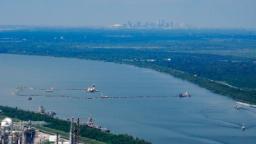CNN
—
President Joe Biden approved an emergency declaration for Louisiana, the White House announced Wednesday, as the state battles saltwater intrusion along the Mississippi River that is contaminating drinking water and threatening water infrastructure.
Louisiana Gov. John Bel Edwards requested the declaration on Monday for four parishes: Plaquemines, St. Bernard, Jefferson and Orleans.
Extreme drought spread across parts of the Mississippi River Basin this summer and pushed water levels to near-record lows. As the river’s flow rate weakened, a surge of saltwater from the Gulf of Mexico pushed upstream, polluting drinking water for thousands of residents south of New Orleans.
With little prospect of rain in the future, officials are working to find solutions before the saltwater infiltrates treatment plants that thousands of more people, including New Orleans.
The president’s approval of the emergency declaration authorizes the Federal Emergency Management Agency “to identify, mobilize, and provide at its discretion, equipment and resources necessary to alleviate the impacts of the emergency,” according to a news release from the White House.
FEMA’s depleted disaster relief fund had $2.4 billion left as of September 19, a FEMA official told CNN, and is on track to lose even more money by the end of the month unless Congress passes a bill to replenish it.
Amid a record-breaking year for billion-dollar disasters, the agency has asked Congress for $16 billion in additional money to boost the fund. That money has been delayed amid a funding fight between Republicans in the House and a looming government shutdown. If Congress takes no action, FEMA is on track to have just $556 million left in the fund by the end of the month, according to its monthly report to Congress.
It was not immediately clear how FEMA intends to fund relief in Louisiana and how the looming government shutdown would affect its operations there. CNN has reached out to FEMA for those details.
During a similar crisis last year in Jackson, Mississippi, in which residents were left without safe drinking water, FEMA reimbursed the state for public assistance and covered the cost of contracted water deliveries that provided bottled water to impacted communities.
But a shutdown would not delay the US Army Corps of Engineers’ response to the saltwater intrusion. The federal agency has access to funds that are already allocated for emergencies like the one Louisiana is experiencing, said Ricky Boyett, an Army Corps spokesperson.
The Corps is working on several big-ticket solutions to the saltwater intrusion. It’s making an underwater sill, or levee, located about 10 miles downstream from Belle Chasse around 25 feet taller to slow the saltwater’s advance. It also announced last week that it plans to barge and distribute up to 36 million gallons of freshwater a day to treatment facilities downstream that have been overwhelmed with salt.
“With regards to the sill construction, the dredging contract has been awarded and those funds are obligated,” Boyett told CNN, and the water barging is being funded with disaster funds that are already obligated to the Corps.
“From our perspective, our district — we’re a civil works district — and the majority of our projects are funded by project, we get appropriations for it,” Boyett said. “So we’re not seeing impacts immediately.”

